Key takeaways:
- Understanding venue cancellation risks involves proactive communication with venue managers and a clear grasp of their policies.
- Effective risk management is vital, requiring backup plans and swift adaptation to unexpected changes to avoid financial losses.
- Strong relationships with stakeholders, including vendors and venue managers, can ease the impact of cancellations and provide support during crises.
- Flexibility and creativity in event planning, along with diligent preparation and rehearsal, can enhance the overall success and experience of events.
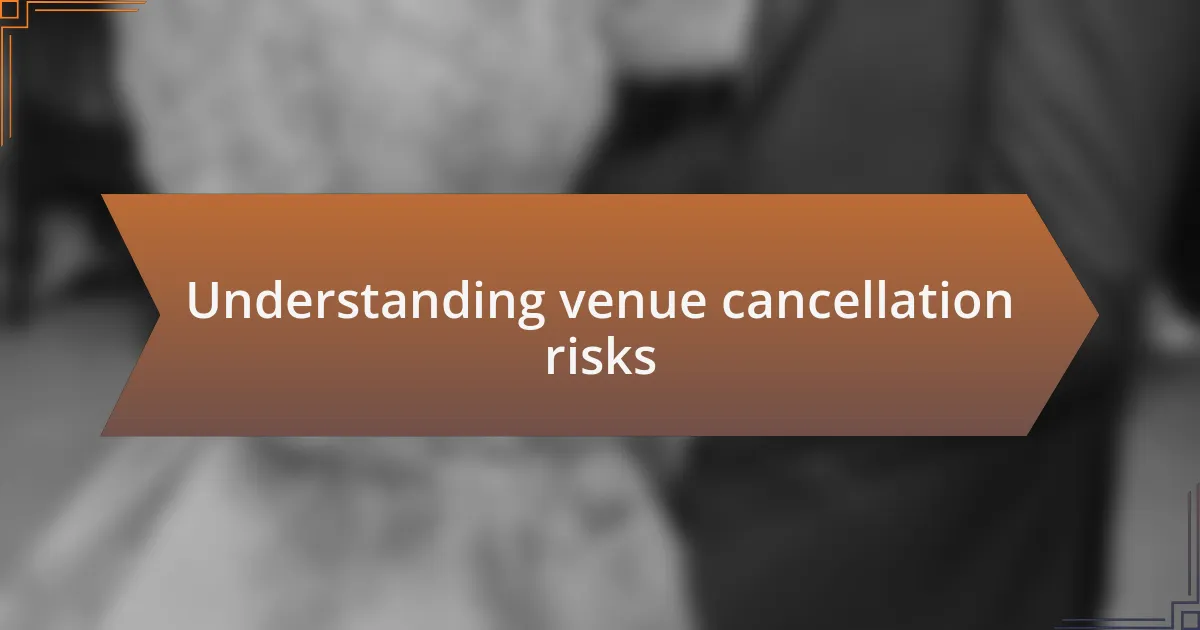
Understanding venue cancellation risks
When I first started managing events, I was naïve about the different reasons a venue might cancel. I learned firsthand how unexpected circumstances, like natural disasters or sudden venue closures, could derail months of planning. Have you ever faced a situation where everything seemed perfect, only for it to unravel at the last minute? I certainly have, and it’s a gut-wrenching experience.
The complexities of venue cancellation risks extend beyond just the venue itself. I’ve experienced events where vendor disagreements or regulatory changes created a ripple effect. It made me realize how interconnected every element in event planning is. Understanding these nuances is crucial. Are you prepared to navigate such unexpected pitfalls?
I’ve often found that communication is key. For instance, the more I cultivated relationships with venue managers, the better I understood their policies and potential challenges. It’s not just about booking a space; it’s about being proactive in recognizing the signs that might lead to a cancellation. Have you checked in with your venue recently? Sometimes a simple conversation can provide insights that save an event from falling apart.
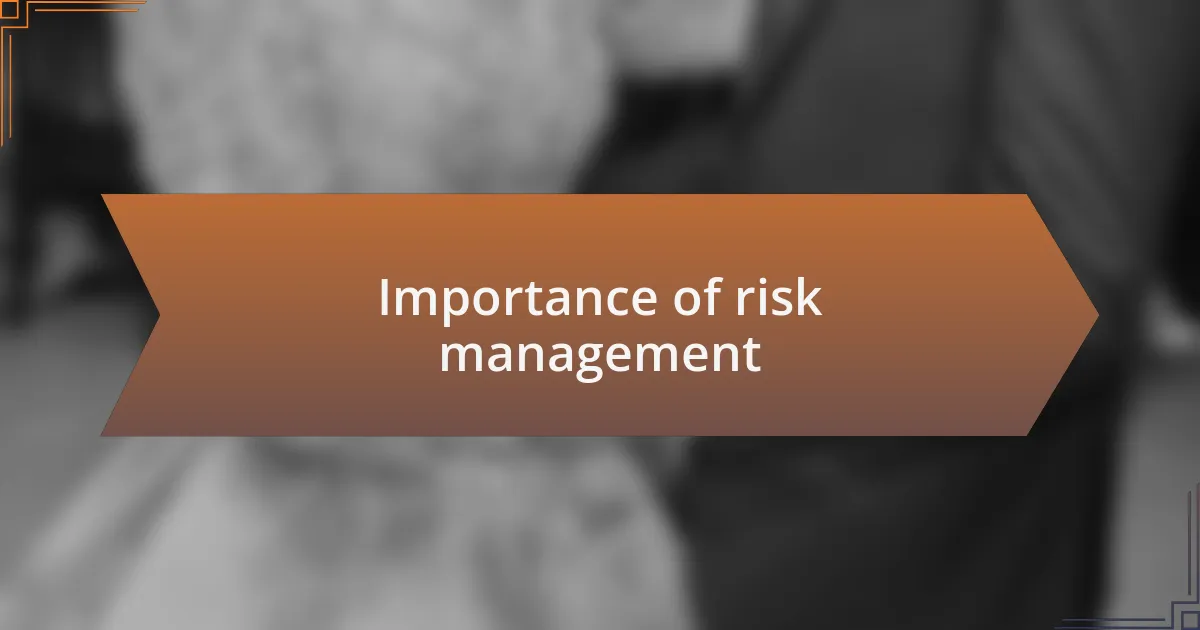
Importance of risk management
Effective risk management is the backbone of successful event planning. When I started out, I underestimated how vital it was to anticipate potential hazards. One time, a venue I had been excited about suddenly announced renovations without warning. What I thought would be an effortless booking turned into a frantic scramble for alternatives. Have you ever found yourself in a similar scenario, caught off-guard by an unexpected change? It can be both stressful and disheartening.
Another aspect I’ve come to appreciate is the ability to pivot quickly when faced with risks. I’ve had instances where understanding the terms of a cancellation policy saved my team from significant financial loss. By having a clear plan and being aware of our options, we managed to turn a potentially disastrous situation into an opportunity for creativity. What about you—do you have backup plans in place that can transform a setback into a success?
Moreover, embracing risk management fosters confidence among all stakeholders. I recall a project where my transparency about potential risks reassured sponsors and vendors alike. They were more willing to collaborate and brainstorm innovative solutions. By involving them in the risk management process, I fostered a sense of unity and shared responsibility. Doesn’t it feel great to work as a team, knowing everyone is prepared for anything that might come our way?
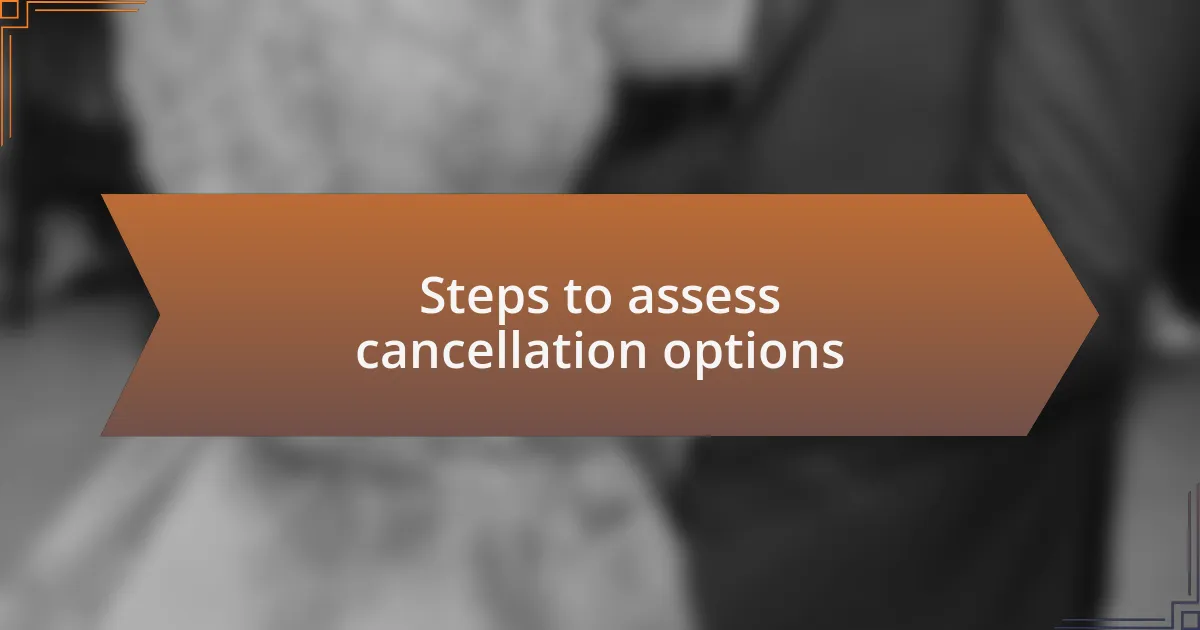
Steps to assess cancellation options
When assessing cancellation options, the first step is to thoroughly review the venue’s cancellation policy. I vividly remember a time when I overlooked a venue that had stringent cancellation terms. It turned out that I was just a few days past the deadline for a refund, and the loss felt significant. Have you ever found yourself in a similar trap? Understanding these terms not only protects your finances but also guides you in making informed decisions.
Next, I recommend contemplating alternative solutions that may soften the financial blow. There have been occasions when I negotiated partial refunds or credits for future events when cancellations were unavoidable. Is it worth reaching out to the venue for a conversation? In my experience, open communication can sometimes lead to favorable outcomes, changing a frustrating situation into something workable.
Lastly, consider evaluating the overall landscape of your event. I often look at factors like the timing of the event and how external conditions, like weather or local regulations, might influence attendance. One of my events coincided with a major sports game, which caused complications. Analyzing these elements helps in developing contingency plans. How well do you know the dynamics that could affect your event? Balancing these uncertain variables with a proactive mindset goes a long way in ensuring your event can adapt, no matter the circumstances.
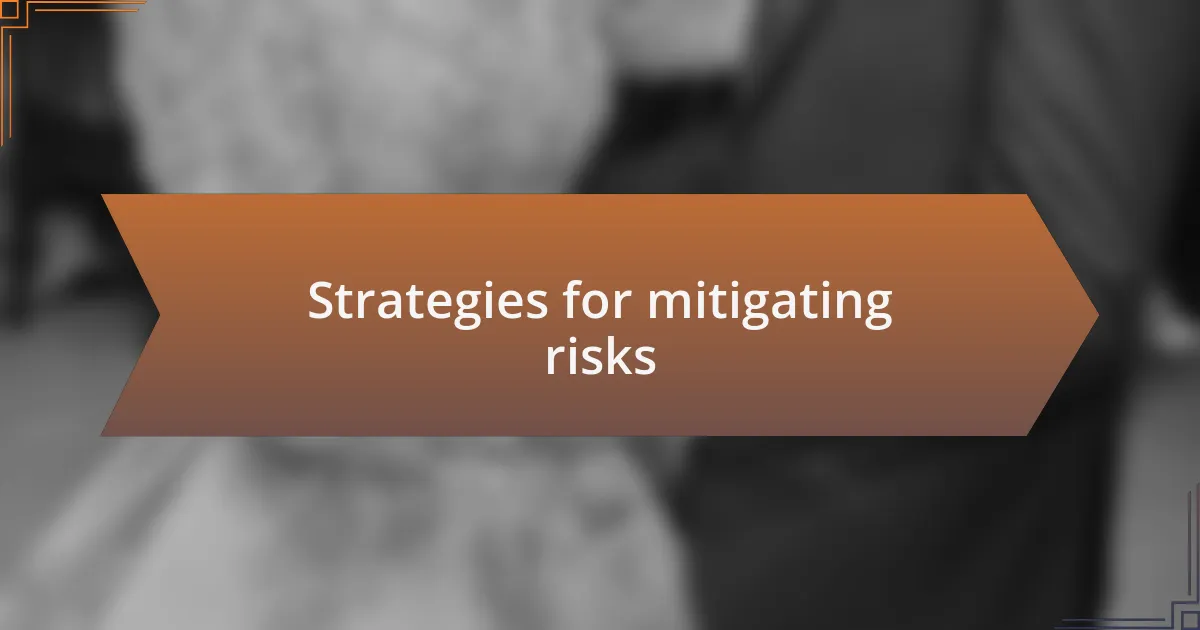
Strategies for mitigating risks
The first strategy I find extremely useful is securing comprehensive insurance for the event. I remember one particular event where unforeseen circumstances—like a sudden health mandate—demanded a swift cancellation. Luckily, I had invested in event insurance, which provided essential coverage and mitigated the financial hit significantly. Have you ever considered how a small investment in insurance could shield you from larger losses down the road?
Another critical approach involves maintaining strong relationships with all stakeholders involved. I once faced a venue cancellation due to last-minute renovations that were completely out of my hands. However, because I had established a good rapport with the venue manager, we were able to swiftly reallocate my event to a nearby location. Building these connections often makes a world of difference when you need to navigate complex situations. Are you tapping into the power of your network when managing events?
Lastly, it’s crucial to have a solid backup plan. Preparing for different scenarios might feel daunting, but I’ve found it to be invaluable. For example, during a significant outdoor event I managed, a sudden storm required us to have an indoor venue on standby. This foresight not only maintained the event’s integrity but alleviated stress among the team and attendees. Do you create contingency plans, or do you find it easier to react once a problem occurs? The peace of mind that comes from being prepared is priceless.
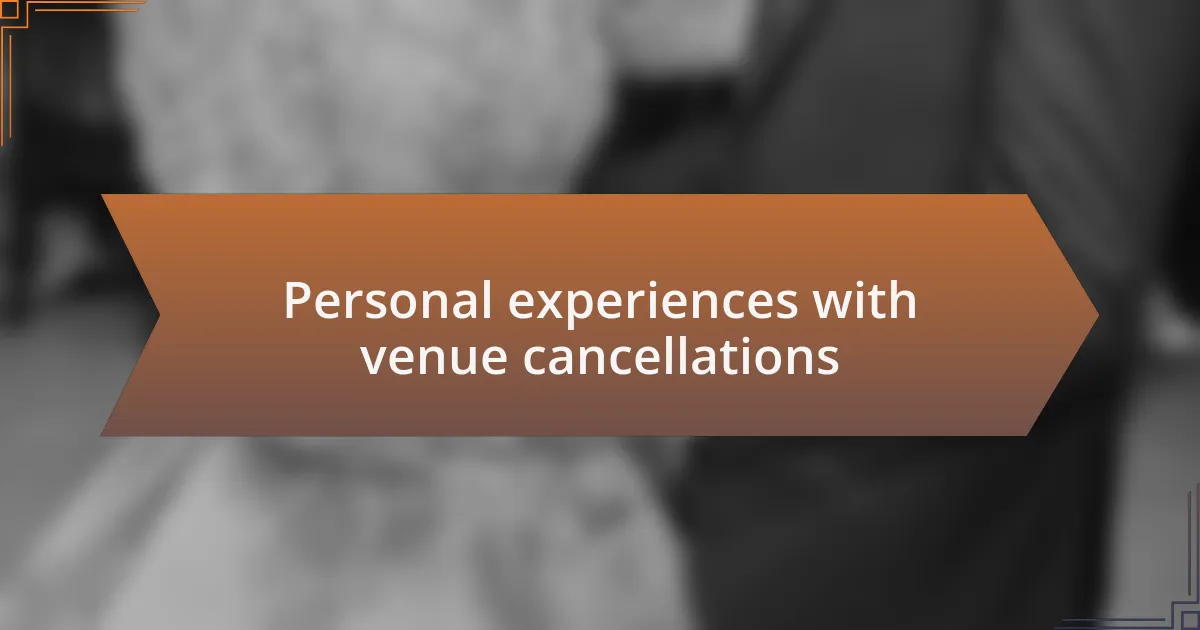
Personal experiences with venue cancellations
I still remember the first time I faced a sudden venue cancellation. It was a crucial event, and just days before, I received a frantic call from the venue stating they had double-booked. My heart sank, but I managed to find an alternative space thanks to a last-minute tip from a colleague. Have you ever felt that rush of panic turn into motivation?
In another instance, I dealt with a cancellation caused by an unexpected natural disaster. As the winds howled outside, I was scrambling to inform all participants while also securing a virtual platform for the event. It was stressful, but I learned an important lesson: communication is key. Have you thought about how effective communication can ease the chaos when cancellations strike?
I also encountered a venue cancellation due to a power outage in the area, which caught me completely off guard. It was disheartening to see my plans unravel, but I quickly pivoted by collaborating with local businesses to set up a pop-up event. This experience taught me resilience and the importance of community support. How do you adapt when circumstances force you to rethink your events?
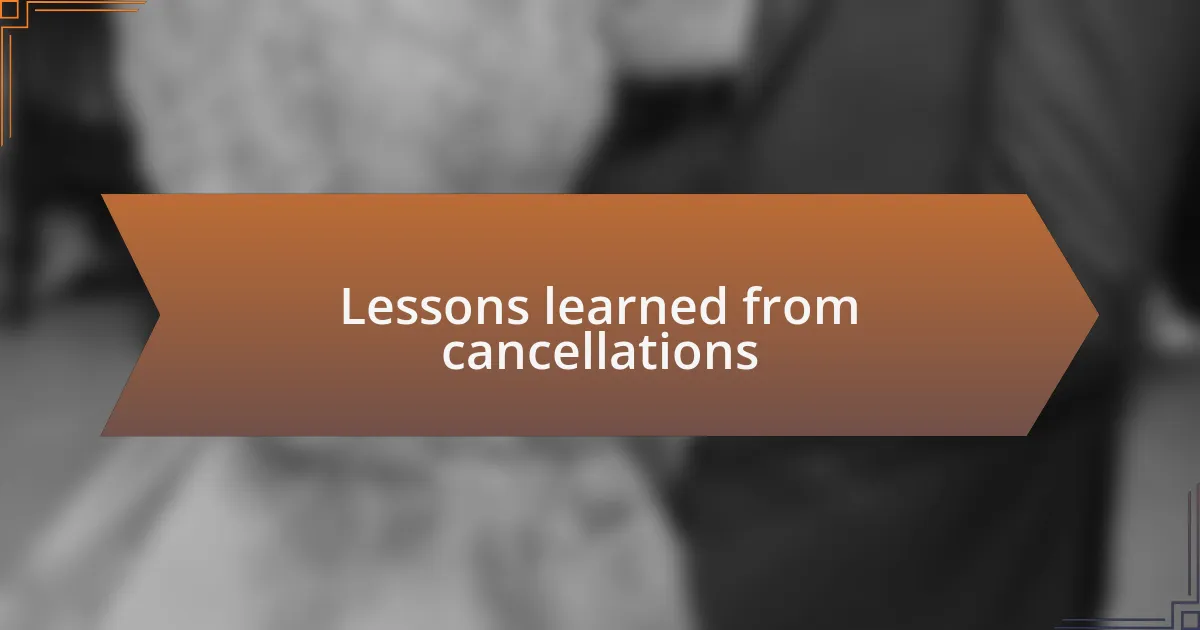
Lessons learned from cancellations
When faced with a venue cancellation, I discovered the importance of having a list of backup venues ready. One time, I was able to secure a smaller hall that wasn’t my first choice, but it turned out to create a more intimate setting that resonated with attendees. Have you ever realized that sometimes, the unexpected alternatives can lead to surprisingly memorable experiences?
I also learned firsthand about the power of building relationships with vendors and venue managers. After a cancellation, one venue offered me priority booking for future events as a gesture of goodwill. This taught me that nurturing connections can pave the way for support in challenging times. How often do you invest time in these relationships that can buffer against setbacks?
Moreover, it became clear that creating flexible plans is crucial. During another cancellation scenario, I had to shuffle not only the location but also adapt to changes in catering and logistics. I learned to embrace flexibility in my timelines and expectations, which ultimately allowed me to maintain a level of calm. Do you think having that adaptable mindset could change your approach to event planning?

Tips for successful event planning
Planning a successful event requires meticulous attention to detail, but I also found that giving myself room for creativity can produce incredible results. For instance, during one of my events, I decided to incorporate live feedback stations. It not only engaged the attendees but allowed me to gather insights in real-time. Have you ever thought about how direct audience interaction could transform your future events?
Additionally, I’ve learned that effective communication with your team is paramount. In one instance, miscommunication led to a last-minute scramble for catering supplies, which could have been avoided with clearer lines of dialogue. It makes me wonder: how often do you check in with your team to ensure everyone is aligned with the event vision?
Lastly, I believe in the power of rehearsal and walkthroughs at the venue ahead of the event. When I led a practice session for an outdoor wedding, we discovered potential obstacles like uneven surfaces that could create safety concerns. Looking back, that preparation not only alleviated stress but ultimately made the day more enjoyable for everyone involved. Have you considered how a little extra prep could enhance your event experience?